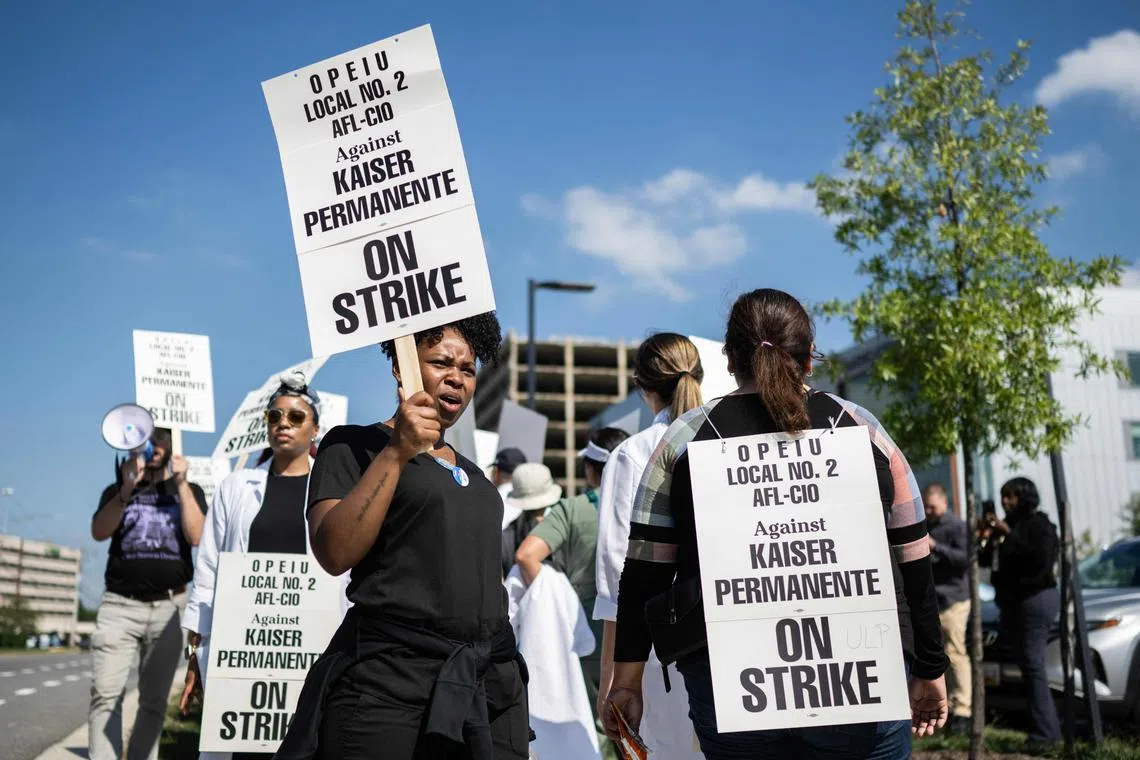Next pandemic could arrive sooner than many think, report warns
Sign up now: Get ST's newsletters delivered to your inbox

About 75,000 employees of Kaiser Permanente went on strike after their union failed to reach a new contract deal.
PHOTO: AFP
WASHINGTON – Covid-19 risks becoming a “forgotten pandemic” – and the global community is still not up to dealing with the next one, warned the authors of a report released on Thursday in Washington.
While there is an increasing risk of new pathogens emerging as a result of, among others, global warming, increasing mistrust between nations is hampering societies’ ability to prevent, detect and respond to such an event, said the report
The report is co-authored by Professor Huang Yanzhong, senior fellow for global health at the Council on Foreign Relations in New York, and Professor Rebecca Katz, director of Georgetown University’s Centre for Global Health Science and Security.
It reflects particular concern for the United States, where more than one million people died during the Covid-19 pandemic.
Prof Katz told The Straits Times that many US states have rolled back their public health regulatory authority; vaccine hesitancy persists, and there is a shortage of trained public health staff.
“Folks are quitting left and right,” she said.
Thus, even with technological advances in medical countermeasures, diagnostics, modelling and surveillance, the next public health emergency in the US will be “exponentially more difficult to respond to”, the authors wrote.
On Wednesday, about 75,000 employees of healthcare insurance provider Kaiser Permanente went on strike after their union failed to reach a new contract deal with the company. In January, more than 7,000 nurses at two New York City hospitals went on a three-day strike for higher wages – and calling for more staff.
Globally, as the world moves on from the acute phase of the Covid-19 pandemic, humanity is at a critical juncture, the authors wrote.
“The stakes are high. When the next pathogen threatens humanity, robust, well-financed public health infrastructure, seamlessly integrated with strong animal health protection and zoonotic disease surveillance, will be essential to reducing death and suffering,” the report said.
Zoonotic diseases are those that can spread from animals to humans.
“Additionally, success in mitigating the pathogen will hinge on decision-makers implementing stronger measures to combat environmental degradation and address climate change,” the authors warned.
Warming temperatures encourage some disease vectors, such as mosquitoes that carry viruses like dengue and malaria, to spread to new areas previously unaffected. Destruction of forests and hunting of wildlife risk viruses jumping from wild species to humans.
Prof Katz said: “The United States is in a tough place, and then globally we have... a prevailing sentiment that the response (to the Covid-19 pandemic) was not very equitable, and that has left many countries with a feeling of distrust.
“In a system which requires (and) which relies on rapid information sharing, I think there are a lot of entities around the world that are more hesitant now to share information about an emerging disease event.”
The general consensus used to be that there would be a generation-defining pandemic about once every 100 years. But now, with additional risk factors, another could emerge in just the next few decades, she said.
Other problems are competing for attention, Prof Huang told ST.
“The world is less cooperative than before the pandemic. Geopolitical tensions certainly play a role. Issues in global governance are preventing us from reaching a consensus on how to prepare for the next pandemic,” he said.
Separately, evidence of this came in September from a much-awaited high-level United Nations meeting on pandemic preparedness in New York, which produced a political declaration by member states on more effective pandemic preparedness and response.
While the outcome was a milestone as it recognised pandemic threats as existential, there were no binding commitments to do anything about it, beyond a resolution to hold another high-level meeting in 2026.
Much of the report’s contents are, therefore, not surprising to medical professionals and epidemiologists.
Asked for his views on pandemic preparedness, Professor Wang Linfa, professor in the emerging infectious diseases programme at Duke-NUS Medical School in Singapore, told ST that he agreed with the concerns raised in the report: “We have to approach this from three different angles: technological, legal-political and financial.”
“We need pre-emptive vaccine and therapeutics development, for instance, broad spectrum products which can be used in the early phases of a Disease X,” he wrote in an e-mail.
As to the political and legal framework, he cited the World Health Organisation’s (WHO) proposal for a convention as a first step. The WHO’s plan is a convention that would strengthen national, regional and global capacities, and resilience to future pandemics.
This would include greatly enhancing international cooperation to, among other things, improve alert systems, data-sharing, research, and local, regional and global production and distribution of medical and public health countermeasures such as vaccines, medicines, diagnostics and personal protective equipment.
On the financial aspect, Prof Wang said: “I think it is time to have a pandemic fund so that we can compensate the nation which first reports a Disease X and, hence, may suffer the financial burden.”


